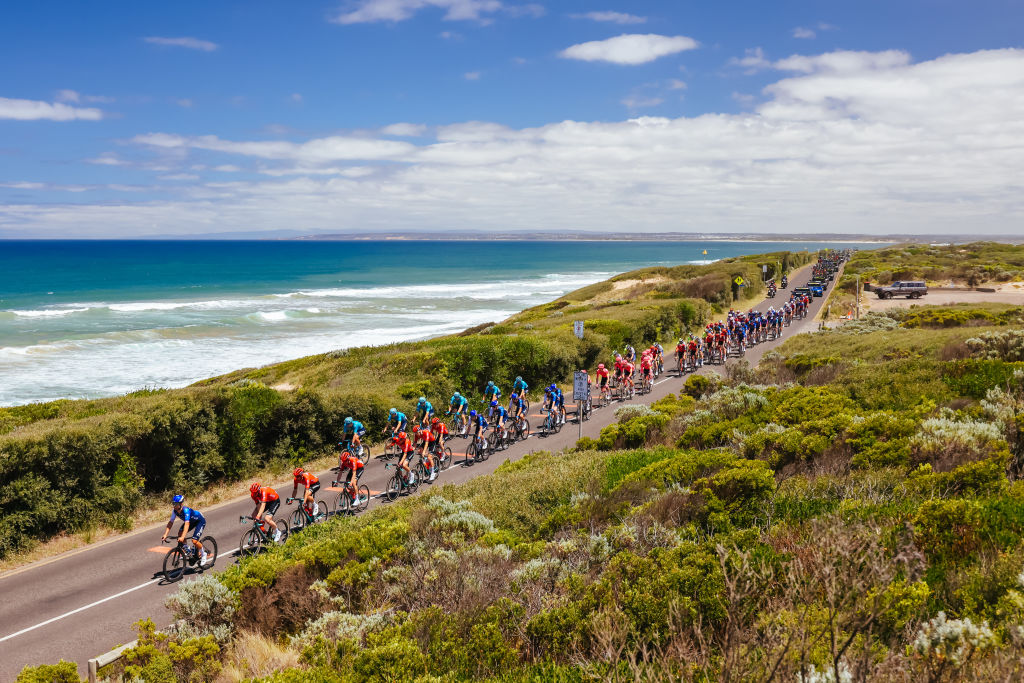
The final wave of the Australian January racing block, which starts the season of WorldTour and Women's WorldTour racing, played out on the waterside course of the Cadel Evans Great Ocean Road Race, once again delivering a predictable level of unpredictability.
The dynamic courses, the early-season date and the opportunity for domestic riders and emerging talents to make their mark all combine to provide an explosive mix. This year was no different. The plans of the favourites were largely frustrated but a new generation of riders got an opportunity to draw a line in the sand.
Two first-time WorldTour winners stood atop the podium to claim the wave trophy, and a number of riders and teams walked away from the race with every reason to face the coming season with confidence.
The racing this year started on Wednesday with the Geelong Classic criterium for the women, followed by the Surf Coast Classic for the men on Thursday. The weekend saw Saturday’s Women's WorldTour race and followed by the men’s event the next day. Cyclingnews was once again on the ground for all the racing, and now we take a look back on some of the key conclusions from the final chapter of the January racing in Australia.
Back with mid-week action

The return of midweek racing helped to bridge the gap between the Tour Down Under and the Great Ocean Race. The Geelong Classic had a hefty – by criterium standards – prize purse of €14,520 thanks to the event’s longstanding practice of delivering equal prizes to the women's and men's field even if the race levels differ. The men were in action the next day in the 1.1 classified Surf Coast Classic.
"It's good to have this race on Thursday, coming off the back of Down Under," Israel-Premier Tech sports director Sam Bewley told Cyclingnews before the race headed out from Lorne. "As much as we love being over here and the Geelong area, it’s a long week, so it's nice to have a race today to break it up."
It provided another hit out, another opportunity for points and podiums and another chance for fans to watch riders fly by on their home roads, with some spectacular territory swept up along the way.
The organisation had originally planned a point-to-point race for the women, but they were unable to tie up the last details to make it a reality. But while that women's midweek road race did not come to fruition this year, the work has already begun to make it a reality for 2025.
"We're ahead of schedule already for 2025," race director Scott Sunderland told Cyclingnews. "So ideally we want to see, both the women's and men's events the same. That's always been our objective – the parity and equality in that."
On the rise
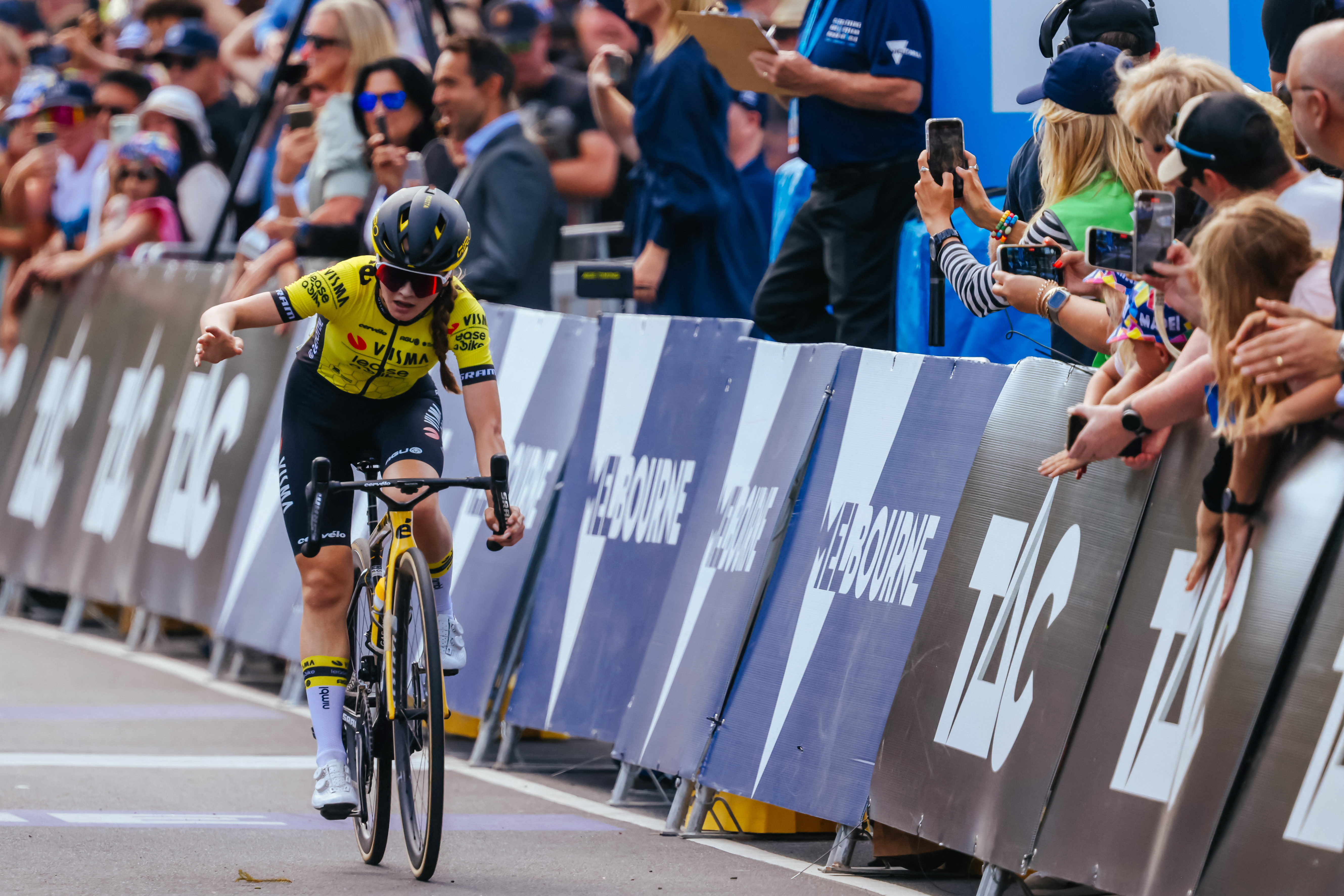
The Cadel Evans Great Ocean Road Race often has a habit of throwing up some unexpected podium placers, and winners for that matter. The women’s race on Saturday followed that pattern. While Cecilie Uttrup Ludwig may have made it onto the podium in third, she was the only one on those steps that had come to attention as a pre-race favourite.
The unpredictable race finished with a shocked 19-year-old on top of the podium instead. This was not just a first WorldTour win for Rosita Reijnhout, or a first professional victory but, as she put it, “my first win ever because I have never won something.”
The Dutch Visma-Lease a Bike rider has aspirations of being a top stage-race performer, and now has made her mark in her second WorldTour season, after coming up through the ever productive Dutch cycling development pathway.
However, Reijnhout wasn’t the only surprise on the podium, with UAE Team ADQ neo-pro Dominika Wlodarczyk charging to second on her 23rd birthday. The Polish rider had certainly already made a mark as an under-23 rider, winning the Watersley Women’s Challenge overall for the past two years and already having a substantial list of 2.2 stage victories on her results sheet, but the step up to WorldTour level presented a bit more of an unknown.
Those question marks are quickly disappearing for Wlodarczyk, who was also fifth overall at the Tour Down Under and now has the jersey of the Women’s WorldTour leader in her luggage.
Next round of Australians to hit the WorldTour?
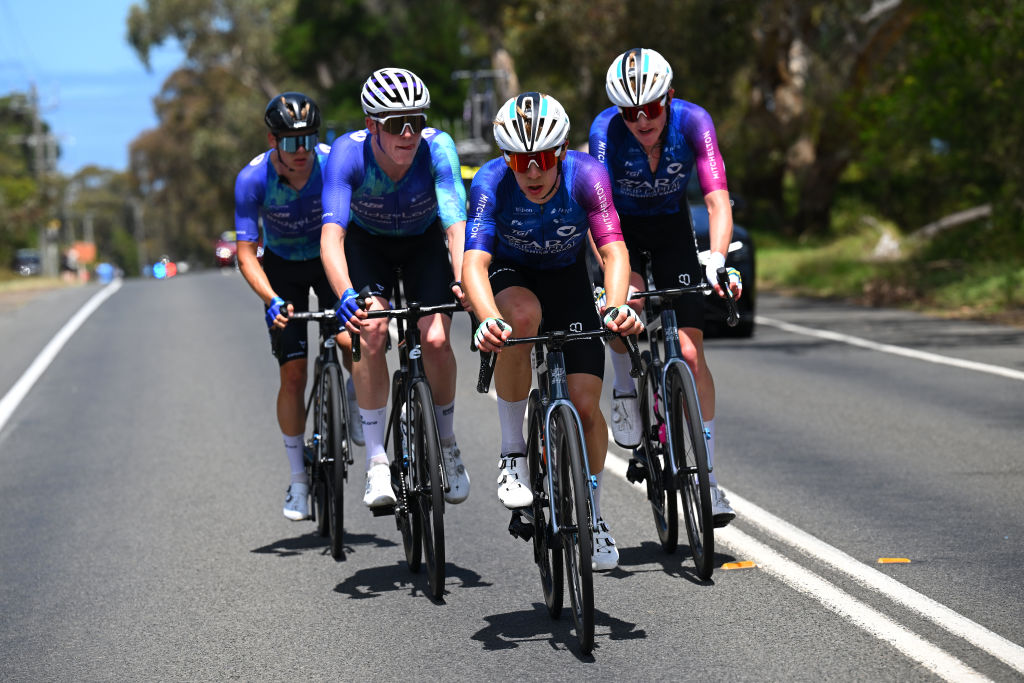
The Australian January racing is the one time of the year when a few of the very best local riders get a chance to see how they stack up against squads of WorldTour professionals. It’s a crucial opportunity because, as Zac Marriage put it: “Everyone else in the peloton is where I want to be, where we all want to be.”
It was almost a given, then, that the two wildcard Australian continental teams would be on the attack as soon as the races got underway and, in the case of the women’s race, the national team were on the offensive as well.
Lucie Fityus (ARA Skip Capital), Gina Ricardo (Team BridgeLane) and Stephanie Hibburt (Australia National Team) all set off in the early break on Saturday, with Fityus and Ricardo claiming the top points in the first sprint, though the tough winds and a nervous peloton made it hard going. Alli Anderson (ARA | Skip Capital) was another of the local riders to take a turn out the front later as well.
In the men’s race on Sunday, faced with calmer winds it was a young but determined quartet out the front of Joshua Cranage, 18, and Dylan Proctor-Parker, 19, of ARA Skip Capital along with Jackson Medway, 19, and Zac Marriage, 20, of Team BridgeLane.
The BridgeLane riders, Marriage and Medway, swept up both the king of the mountain and sprint jerseys, claiming full points along the way before being swept up just over the top of the second last ascent of Challambra climb at 26km to go. It was a long but rewarding day out front and both riders hope it will be a stepping stone to bigger things.
Medway, for one, had already drawn attention right from the start of the season when he claimed the U23 time trial at the Australian Championships, beating Hamish McKenzie, who will step up to the WorldTour with Jayco-AlUla in 2025, and Oscar Chamberlain, who was the junior world champion in the discipline in 2023. The triathlete, who has made the switch to cycling relatively recently, seems a particularly likely candidate to join the pair in the international ranks. The rider said that so far he had received some “messages here and there, but nothing big yet,” adding, “hopefully after going to Europe I’ll have a few results in the bag and we can sort something for next year.”
Knowing how to win ... and lose
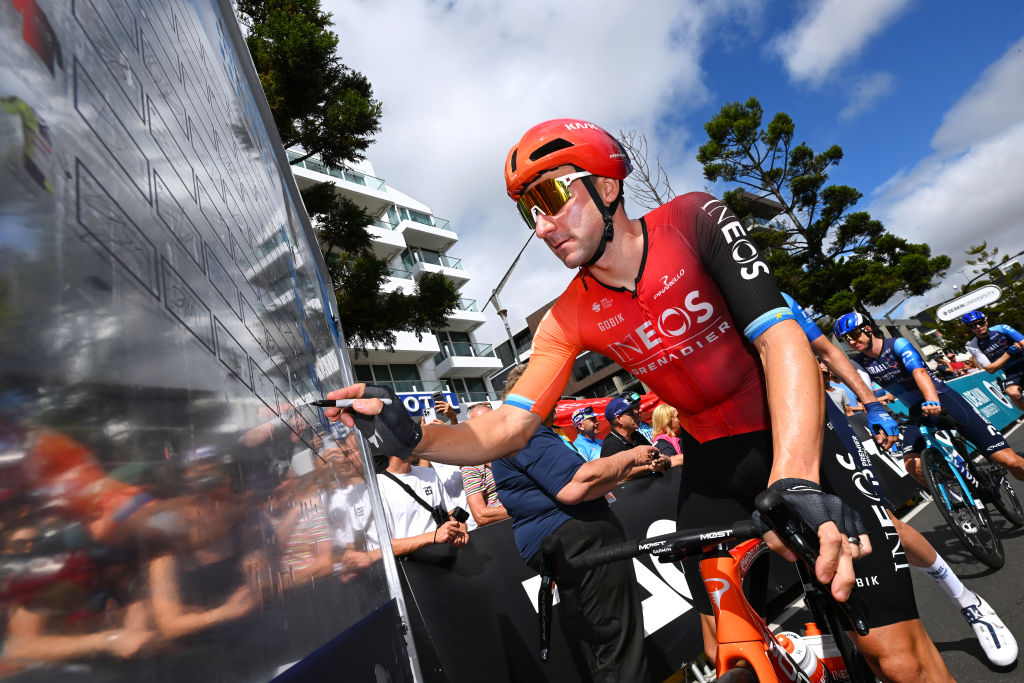
“I know how to do it and I know how to lose it,” said the only rider in the Cadel Evans Great Ocean Road Race to have won it before, Elia Viviani, in a pre-race interview with broadcaster Seven.
The Ineos Grenadiers rider’s second place at the Surf Coast Classic showed the 2019 winner was entering the weekend with some strong form, and there was no doubt he had a strong team behind him, including the firing Tour Down Under runner up Jhonatan Narvaez and the force of Filippo Ganna, but history was always against him. The race is nothing if not unpredictable, with different winning scenarios playing out and not once, in either the women's or men's race, has a rider been able to deliver repeat victories.
That held firm in 2024. Viviani may have placed a big target on the race, but this was not a year for the sprinters. The Italian finished back in a group 24 seconds back from the winner, including the rider who came second to him in 2019, Caleb Ewan (Jayco-AlUla). The climb of Challambra topping out nine kilometres from the line had defeated both of them, but the genius of the course is that there is always the hope that it may not next year.
The race has always been, and continues to be predictably, unpredictable.
Edwards back in full flight
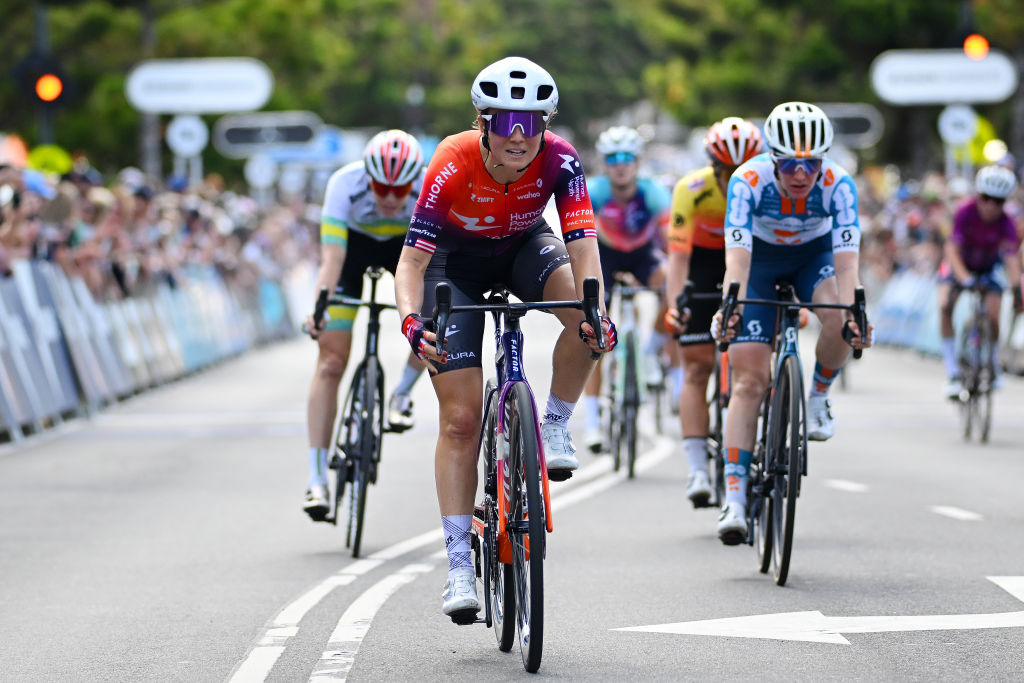
The last time Ruth Edwards (nee Winder) lined up at the Cadel Evans Great Ocean Road Race she was fresh off her 2020 win at the Santos Women's Tour Down Under, and she claimed a strong eighth in Geelong in her third appearance at the event.
The American rider already had a ninth and second place to her name at the race, so it is clearly a course that suits her, but when the race returned after the COVID-19 pandemic in 2023, she was on present. Edwards had retired at the end of 2021 but, as it turns out, not for good.
Given the success the 30-year-old had enjoyed in Australia, it seemed a fitting place to reboot her career and, as she told Cyclingnews before the Tour Down Under "to see how good I can be." It hasn't taken too long for the answer to that question to start to be revealed.
It was a solid return with her new team, Human Powered Health, at the Tour Down Under, where Edwards placed 16th overall, but better was still to come. Edwards just missed the podium on Saturday, but this clear show of strength is an early indication that the rider hasn’t come back simply to ride around in the bunch and mentor others.
“I’m feeling super confident being back in the peloton and I’m excited to be able to push and try and race hard,” Edwards said. “I take a lot of motivation going into European races.”
Pithie's prize

Groupama FDJ's Laurence Pithie came away from last week’s Tour Down Under with valuable lessons learned. The New Zealander may have been among the rising generation of riders that had the distinct disadvantage of trying to build their budding international race experience at a time when COVID-19 locked the nation's border, but he is quickly making up for lost time.
At Mount Lofty on the final day of TDU, he may have been berating himself for going too early and missing a prime opportunity to take victory, but by the following Sunday he already had absorbed the lesson and managed to play out the alternate plan to perfection. Pithie played the waiting game through the attacks, this time saving his effort for precisely when it was needed, in the small bunch sprint.
His sound analysis and ability to adapt bodes well for the rider as he heads into his second season as a professional, with a Giro d'Italia debut on the radar.
Sunday may have been Pithie's first WorldTour podium, but with the way the 21-year-old has hit the ground running this season it seems like it may not be too long until there is another.
Leaving at intermission
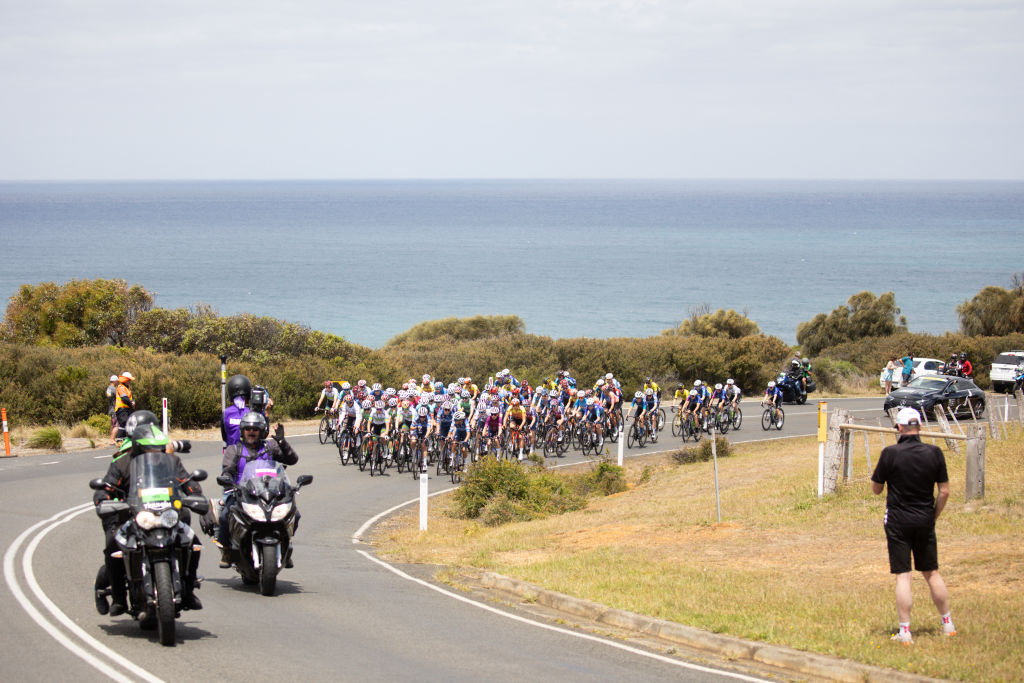
Every men's WorldTour team has to come out to the Santos Tour Down Under but there is nothing compelling them to stay on for the Cadel Evans Great Ocean Road Race, given the UCI regulations only require participation in events that were registered on the 2016 WorldTour calendar. That means that even though the break in racing between the two may have been just an intermission in the Australian block of racing, many of the men's squads took it as their cue to return to their home base in Europe, and as a result they missed the finale.
It meant the race that started in 2015 and shifted up to WorldTour status in 2017 – just a year later than the 2016 calendar specified for compulsory attendance – had just ten WorldTour teams on the start line, down from 11 in 2023 and 15 back in 2020. The subsequent COVID-19 cancellations seemed to lead to an alteration in early-season habits. The total number of riders in the peloton therefore, with the two wildcard Australian continental teams of ARA Skip Capital and Team BridgeLane added into the mix, was just 88.
The Women's WorldTour teams, however, where attendance wasn't compulsory at either event, rose to nine from six the previous year with none drifting away between the two events, which led to a significant increase in the depth in the women's field.
It's positive to see numbers head in that direction for the women's field but discouraging to see the opposite trajectory in the men's race – it seems as if something is awry in the WorldTour system for a well-run event that earned the top-tier designation to be in a position where perilously close to half of the top-tier teams are not showing. If only the race had hit the WorldTour level a year earlier.







